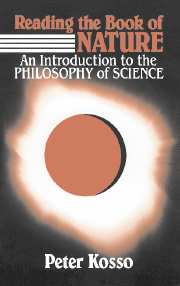Book contents
- Frontmatter
- Contents
- Acknowledgments
- Introduction
- 1 Theories
- 2 Internal and External Virtues
- 3 Explanation
- 4 Confirmation
- 5 Underdetermination
- 6 Observation
- 7 Blurring the Internal–External Distinction
- 8 Coherence and Truth
- 9 Objective Evidence
- 10 Science and Common Sense
- Glossary of Terms
- Suggested Reading
- Index
- Frontmatter
- Contents
- Acknowledgments
- Introduction
- 1 Theories
- 2 Internal and External Virtues
- 3 Explanation
- 4 Confirmation
- 5 Underdetermination
- 6 Observation
- 7 Blurring the Internal–External Distinction
- 8 Coherence and Truth
- 9 Objective Evidence
- 10 Science and Common Sense
- Glossary of Terms
- Suggested Reading
- Index
Summary
This is where Chapters 3 and 4 have been leading. In the terminology of internal and external virtues, external virtues do not determine that a theory is true or that it is false. A theory can be explanatory and can be favorably tested against the observable evidence yet still be false. The logical structure of explanation and testing is never of the form that the evidence entails a theory. Rather, it is the other way around. A theory entails its evidence, and because of this, observation of the evidence cannot stand as clear confirmation of the theory. Nor can the evidence provide unambiguous falsification since, as we have seen, realistic cases of theory testing are of the form, theory plus auxiliaries entail the evidence, thus confusing the issue of assigning guilt in the case where the predicted event does not occur.
To put it bluntly, the observations of the world, that is, the reports on the manifest phenomena, are not sufficiently informative to single out the one true theory of what is going on behind the appearances. This is not to say that anything goes, that one theory is as good as another, or that observations have no significant role to play in the scientific justification process. Explanation and testing are strict and crucial discriminators of scientific theories in that a theory is unacceptable if it is in no way explanatory and does not cooperate with other theories to make true predictions.
- Type
- Chapter
- Information
- Reading the Book of NatureAn Introduction to the Philosophy of Science, pp. 87 - 104Publisher: Cambridge University PressPrint publication year: 1992



